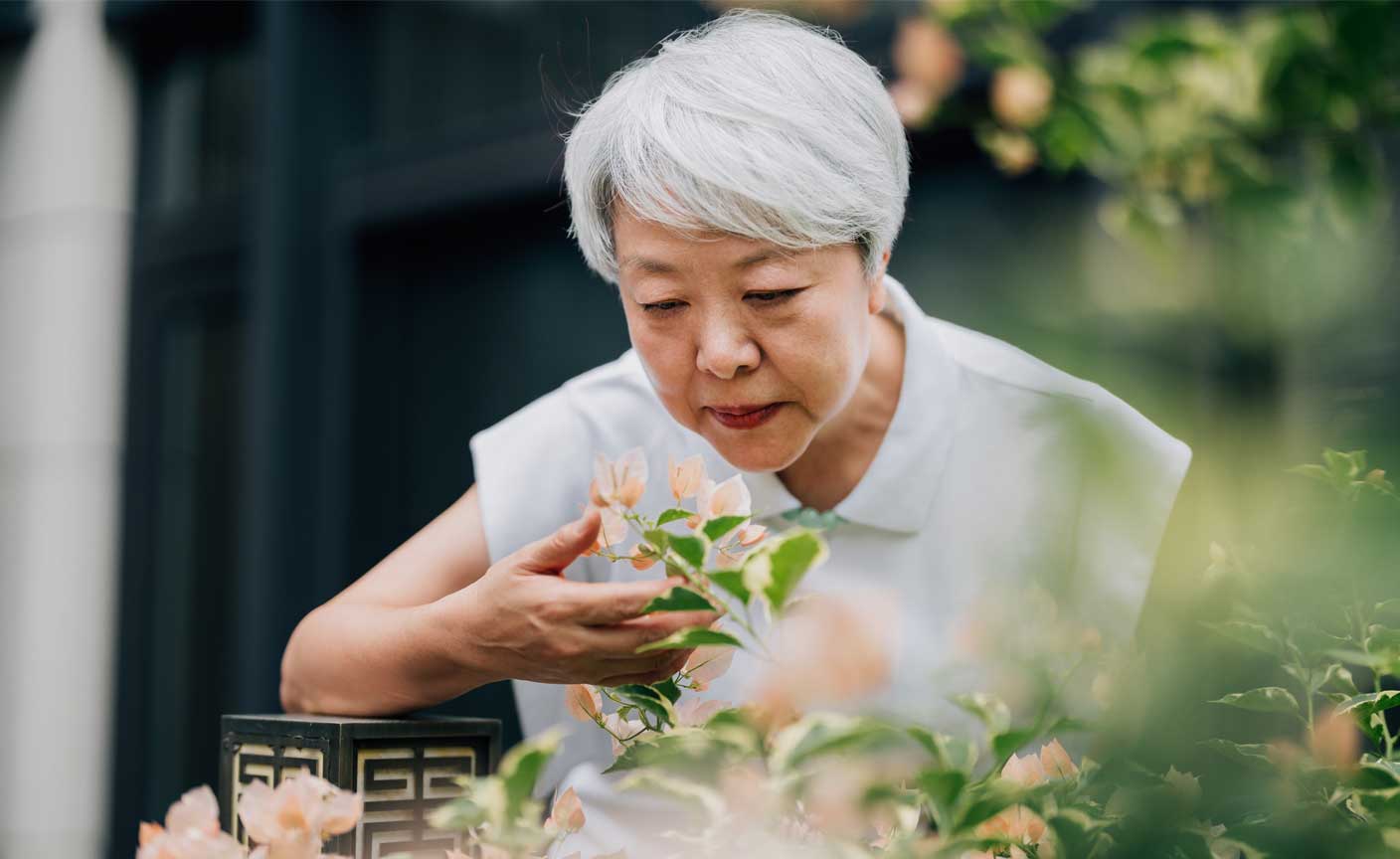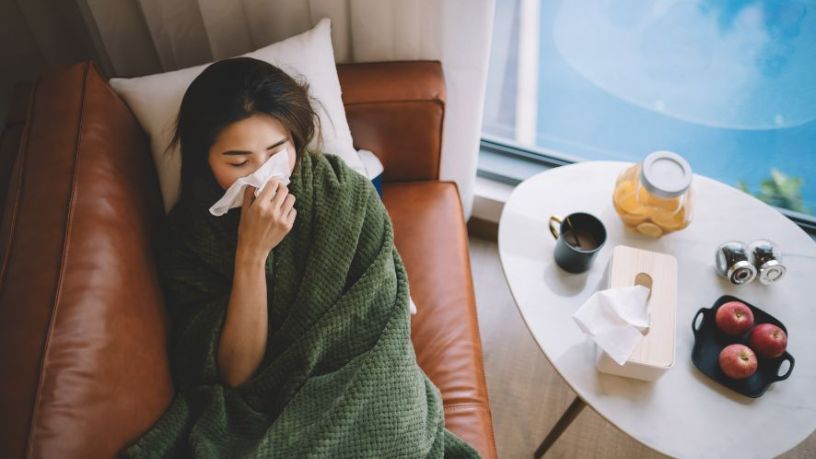There are a range of common hay fever symptoms, from watery eyes to sneezing.
Key takeaways
There’s more to hay fever than the name suggests.
Discover 7 great tips for dealing with allergies.
When spring arrives, you might be among the one in 5 Australians who experience hay fever.1
Despite the name, hay fever is not caused by hay at all. Rather, pollens, dust mites, mould and animal hair are the key culprits, often triggering allergic reactions upon contact with the eyes or nose.
What’s more, fever isn’t a symptom. Instead, those with hay fever may experience:
- a runny or itchy nose
- sneezing
- itchy, watery eyes.
And while most people get hay fever in spring (the peak period for airborne pollens), you can actually get it at any time of the year.
So, what can you do about it? Here, we share 7 great tips to help you through the sneezing season.
1. Know your triggers
Pinpointing what you’re allergic to can help you avoid or minimise your symptoms. But that can be easier said than done, especially if you’re the type of person who gets attacked from multiple fronts.
Start by observing patterns in your symptoms and look for any trends. For instance, do your symptoms go away when you’re on holiday? Carefully consider your environment, like the plants, trees and weeds that grow in your garden. Compare how you feel at your usual places, like your home, office and local park.
2. See a doctor
Visiting your GP is often a good place to start if you need help managing hay fever. They may encourage you to take a skin-prick allergy test, or they may refer you to a clinical immunology or allergy specialist for further investigation.
Your doctor can also provide advice about treating irritating and uncomfortable symptoms.
3. Avoid exposure
Minimising your exposure to a known trigger, like pollen, may help reduce your hay fever symptoms.
If pollen is a trigger, you might try checking the daily pollen count on a monitoring app or website.
If it’s a windy or sunny day and the pollen count is particularly high, it can help to have hay fever medications on hand. On these days, you might also:
- keep your windows and doors closed
- change your clothes and have a shower after going outside
- remove your shoes when you go inside (to avoid bringing allergens in)
- wear sunglasses to protect your eyes
- wash your hands and then rinse your eyes with water to remove allergens.
Keeping your house as clean and dust-free as possible can also help minimise dust mites, mould and pet hair. You may even consider getting an air purifier with a high-efficiency particulate absorbing (HEPA) filter, which can help remove common allergens in the home.
If grass is a trigger, avoid mowing the lawn or wear a mask when you do.
Chemicals like pesticides, insect sprays and paint can also cause irritation.
4. Don't smoke
5. Rethink your drink
Did you know that beer, wine and spirits often contain histamines, which can trigger sneezing, a runny nose and wheezing? Alcohol can also make you more sensitive to other allergens, so try not to overdo it when you’re dealing with hay fever.
6. Plant a low-allergen garden
If the plants that are driving you crazy live in or outside your own home, perhaps some landscaping is in order.
Avoid wind-pollinated plants and European trees like ash and birch. Instead, choose nectar-rich varieties, including Australian native plants labelled ‘bird-pollinating’, or other low-pollen producing varieties of plants and grass.
7. Consider medication
Certain medications are designed to alleviate hay fever symptoms, including over-the-counter and prescription-only varieties. Some common options include:
- antihistamines, which can help relieve general symptoms
- corticosteroid nasal sprays, which can reduce or even prevent inflammation of the nasal passages
- decongestants and eye drops, which can provide targeted temporary relief.
Talk to your GP or pharmacist about your symptoms and lifestyle to help pick the right medication for you.
In severe cases, a clinical immunology or allergy specialist may suggest allergen immunotherapy, also known as ‘desensitisation’. This is a long-term strategy that reduces the severity of hay fever symptoms and the need for regular medications.
Hay fever may be common, but that doesn’t make it any less irritating. The good news is there are plenty of treatment options that can help reduce its impact on your daily life, helping you spring back to action and enjoy life.
Resources
Allergy & Anaphylaxis Australia has online support resources available. You can also call for help and support on 1300 728 000.
Allergy 250K provides support for teenagers and young adults.

Want to breathe easier?

At Bupa, trust is everything
Our health and wellbeing information is regularly reviewed and maintained by a team of healthcare experts, to ensure its relevancy and accuracy. Everyone's health journey is unique and health outcomes vary from person to person.
This content is not a replacement for personalised and specific medical, healthcare, or other professional advice. If you have concerns about your health, see your doctor or other health professional.
1Australian Government, Australian Institute of Health and Welfare. (2020). Allergic rhinitis ('hay fever'). Australian Government, Australian Institute of Health and Welfare.
2National Asthma Council Australia. (2024). Hay fever (allergic rhinitis) and your asthma. National Asthma Council Australia.
You might also like...
5 natural hay fever remedies
Treating hay fever with medication might not always be ideal. Learn 5 natural remedies that can help relieve your symptoms.
Hay fever: A quick guide
You might deal with hay fever every year, but how much do you actually know about the allergic condition? Discover the basics with this quick guide.
Asthma: What you need to know
Asthma is a common condition that affects one in 9 Australians. So, what is it, how is it diagnosed, and how can you manage it?
Asthma, hay fever and eczema: What you need to know
Allergic diseases such as asthma, eczema and hay fever often occur together. Learn about each condition and how to manage it.





